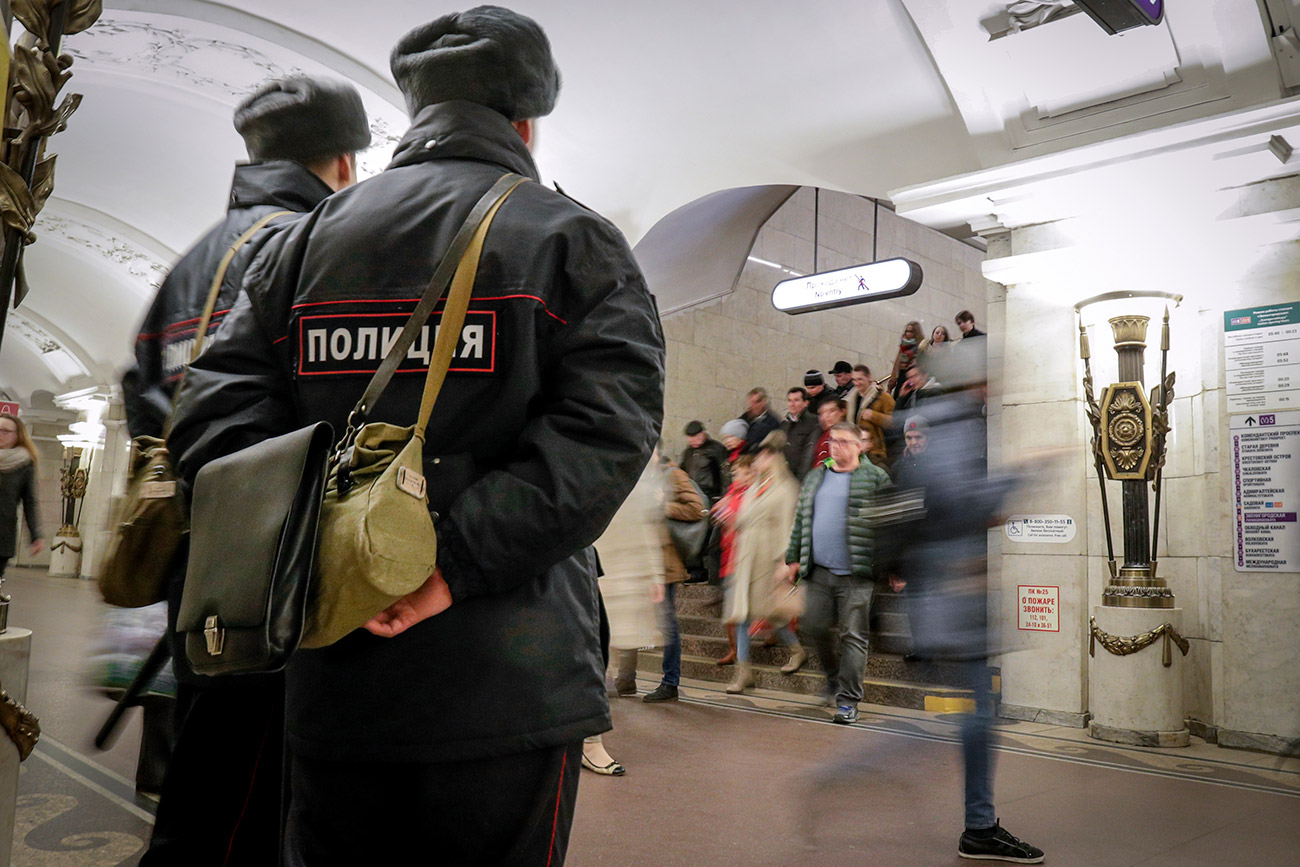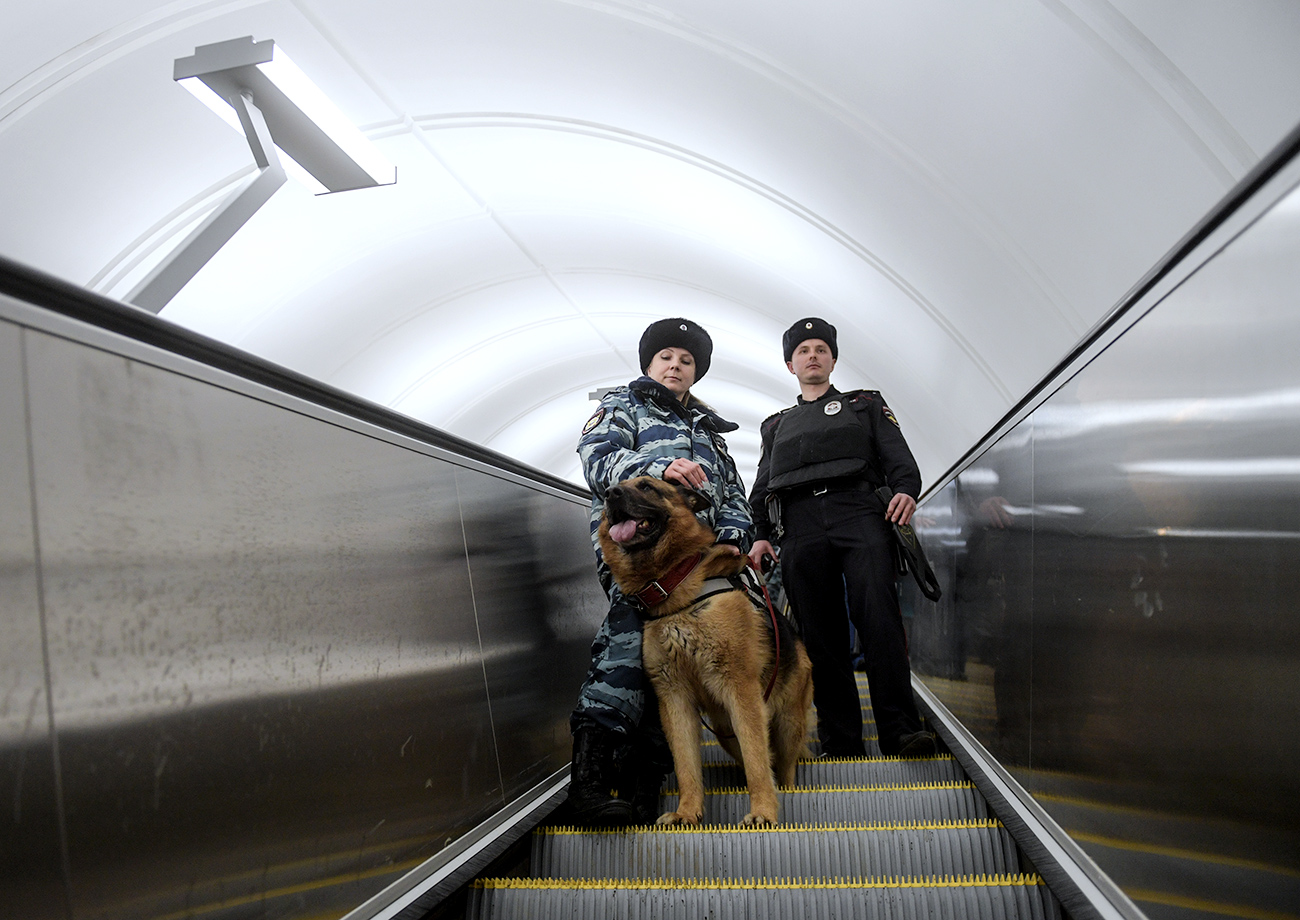St. Petersburg metro blown up by 'extremists back from Syria'

Prior to the explosion in St. Petersburg the unknown group had turned to the "Russian people," asking them to put pressure on the government to stop "the war against Muslims." Photo: Policemen patrol at Pushkinskaya subway station in St.Petersburg, Russia on April 7, 2017.
APThe message from the extremist group Katibat al-Imam Shamil (aka Imam Shamil's Battalion), claiming responsibility for the St. Petersburg metro bombing, appeared on April 24 on a Mauritian website. According to the mass media, the jihadists often use this source as an outlet.
Before, the unknown group had turned to the "Russian people," asking them to put pressure on the government to stop "the war against Muslims in Syria, Chechnya, and Libya." The extremists' statement called the executor of the terrorist act Akbarjon Djalilov one of the members of the "battalion" and warned Russia of new attacks.
From the text it’s understood that the group is related to Al Qaeda, notes the media. The BBC says the statement had been circulated by influential members of the organization with the help of the Telegram instant messaging service.
There are two theories concerning the origin of the group's name. One says that the "battalion" mentioned on the Mauritanian source is named in honor of a Chechen extremist who fought in the two Chechen Wars during the 1990s and 2000s, Shamil Basaev. The second alludes to Imam Shamil, who united the North Caucasus highlanders in the 19th century to fight against Russia for several decades.
Groups "sprouting like mushrooms"
The fact that the group was unknown earlier does not mean that the statement is false, experts believe. In the opinion of Sergei Demidenko, Middle East scholar from the RANEPA Institute of Social Studies, such a group can definitely exist. "It’s impossible to predict the appearance of such structures. Usually these kinds of groups appear, trying to prove themselves, in order to swear allegiance to something more substantial – Al Qaeda, for example. The number of such groups is infinite. They used to sprout like mushrooms earlier in Iraq," he told RBTH.
Meanwhile, Director of the Center for Middle East and Central Asia Studies Semyon Bagdasarov notes that extremist groups are constantly appearing, and in large numbers.
Alexander Shumilin, head of the Center for Analyzing Middle East Conflicts at the RAS Institute in the U.S. and Canada, says the statement appearing on the Mauritian website is not strange: The jihadists use any accessible platform for broadcasting their messages.
Terrorists are regrouping
In Shumilin's view, the appearance of the "battalion" may be proof that serious changes are taking place in the terrorists’ ranks. "At the moment the main terrorist organizations are regrouping their forces. As the basic formations of Islamic State in Syria and Iraq are being destroyed, the militants and their operational activity will move to the periphery, to places like the North Caucasus."
As Demidenko underlines, many Russian citizens are fighting among the extremists in the Middle East. In his words, there are groups in Syria that are completely composed of Chechens. As they are squeezed out of the region they gradually return to their motherland.
Before, when ordering the arrest of one of the defendants in the St. Petersburg case, a judge stated that there is a possibility of a link between the militants who carried out the terrorist act in the metro and the extremists in the Middle East. She mentioned information about the financing of the terrorist act by members of an international extremist group in Turkey.
A new edition of leftist ideology
Experts say that in order to counter the jihadists' threat, Russia needs to develop a complex strategy. It is not enough to just fight the extremists in the Middle East. In this case they will just start returning to their homelands more quickly, including to Russia.
Demidenko believes that the Russian special services "must concentrate on the extremists' homes – that when they return, everything will be in order." However, it would be a strategic mistake to just count on force, since in the present case society is being challenged by carriers of certain ideologies – adherents of radical Islamism or Wahhabism.
This radicalism cannot be defeated by operative measures since the vitality of this ideology is conditioned by the social component, explains Demidenko. Its egalitarian ideas are oriented towards "the humiliated and offended."
"Basically, this is a new edition of the leftist ideology," he affirms. "To successfully counter radical ideas Russia needs to correctly structure its domestic policy and propaganda work so that the extremists find themselves in a cultural, political and economic vacuum."
Read more: Experts forecast difficult years ahead as terror attacks rise in Russia>>>
If using any of Russia Beyond's content, partly or in full, always provide an active hyperlink to the original material.
Subscribe
to our newsletter!
Get the week's best stories straight to your inbox
